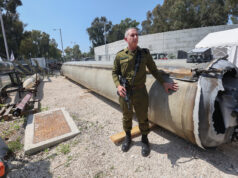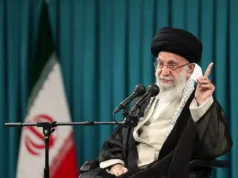Israel should insist its war against terrorists in the Gaza Strip “will end if Hamas [Palestinian Islamic Resistance Movement] surrenders and releases the hostages,” says Barry Shaw, senior associate for public policy at the Israel Institute for Strategic Studies. But “the shoe was put on the other foot,” he told participants in the Jewish Policy Center’s April 11 webinar.
Somehow, Jerusalem is supposed to accept a cease-fire and release 900 Palestinian terrorism suspects, “150 with [Israeli] blood on their hands. … Hamas says it only has 40 hostages,” Shaw said. But Israel estimates it still holds 136 of those seized during the October 7 onslaught in Israel that left more than 1,200 murdered and nearly 250 captured. It does not know how many are still alive.
Since approximately half-a-dozen are U.S. citizens, Shaw said “I would have thought your administration would have gone ballistic” over their fate. But it has not. If Hamas cannot produce the other hostages, “the United States should go to the United Nations” and introduce a resolution calling for “an international arrest warrant for all Hamas leaders” including those reportedly living in Qatar, Lebanon, Turkey and the United Kingdom, he asserted.
Shaw, author of three books about Israel and the Arab conflict with it, including Israel, Reclaiming the Narrative, decried “accusations and slanders against Israel by people who should know better.” That group includes those at the White House, State Department and in the news media who are influenced by and advance Hamas’ propaganda campaign, he added.
One widespread lie against Israel, Shaw said, is that “we’re starving the Palestinians in Gaza.” However, according to figures from the U.N.’s own World Food Program and Israel’s COGAT (Coordinator of Government Activities in the Territories) the 121 million tons of food required since October 7 has been exceeded nearly three times, now averaging 295 million tons. And this is without counting deliveries from Egypt, or Jordanian and U.S. air drops, he added.
“There are 23 bakeries working in Gaza,” producing “two million loaves a day,” from April 2 on. In recent days Gaza food prices have dropped by half, he said. “In other words, … food is plentiful in Gaza.”
Another influential anti-Israel lie, Shaw said, is the Hamas casualty figures in Gaza. He noted that the Hamas-governed Gaza Health Ministry now claims approximately 32,000 fatalities since the war began last October, of whom 70 percent are said to be women and children and none identified as combatants.
But Shaw noted that Israel claims to have killed at least 12,000 Hamas, Palestinian Islamic Jihad and other terrorists, and roughly 200 terrorist rockets fired at Israel have fallen short into the Strip causing fatalities like those at al-Ali Hospital original blamed on Israeli forces. In addition, other deaths are from expected natural causes.
He said this means the widely cited figures civilian fatalities—which U.S. President Joe Biden, among others, has deplored—amount to more Hamas propaganda. In fact, Shaw stressed, U.S. military officials, who continue to maintain what he termed “great camaraderie” with Israeli counterparts, “are telling us … the way the IDF [Israel Defense Forces] is fighting this war sets the standard” for urban combat. He said the non-combatant to combatant fatality ratio in Gaza stands at 1.5:1, whereas in U.S. engagements in Afghanistan, Iraq and elsewhere it at times reached 7:1 or higher.
Lebanon, from where Iran’s biggest proxy force, Hezbollah, has been firing 60 to 80 rockets a day at Israel, represents a second front and Iran itself the third in a Tehran-led existential war against the Jewish state, Shaw said. “The danger from Hezbollah is far greater than from Hamas.” One hundred thousand Israelis have been driven from their homes in the country’s north by Hezbollah’s bombardments. “No one is going to live next to the border” until this is resolved, he added.
As for Hamas, Shaw noted that Benny Gantz, a member of Israel’s three-person war cabinet with Prime Minister Benjamin Netanyahu and Defense Minister Yoav Gallant, said in Washington that Israel would attack Hamas in Rafah, a city near the boundary with Egypt and the movement’s last stronghold. “If we don’t defeat Hamas, they will come back again and again.”





